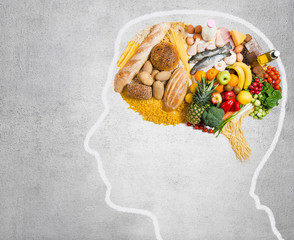It is common knowledge that there is a direct correlation between your mental wellness and your physical wellness. When one begins to decline, the other will be sure to follow. A complete and well-rounded approach to your well-being is the best way to achieve a strong mental and physical state.
When it comes to the ways in which to strengthen your body in order to strengthen your mind, there is a lot of information available. Sometimes, though, that information can be misleading. All too often, the topic of physical wellness can get clouded by trends and fads in the world of diet and exercise.
Be that as it may, if you are currently looking for ways to help you and your family improve overall mental well-being, one of the best places to start is with your diet. Here are a few tips on how to use food in order to improve mental wellbeing.

Seek Help When Starting Better Eating Habits
Even though we may wish to hang onto our favorite unhealthy foods, it is no secret that such things as sweets and soft drinks are unhealthy. The negative impacts of consuming too much of such food items as these are many. On the less serious side, you and your family might end up having less energy and a slightly weakened immune system when too many unhealthy foods are allowed into the family diet. The more serious side of things, though, the consequences can be severe.
Unhealthy eating habits can also lead to poor mental health, especially for children and teens who are still developing their mental toughness and self-esteem. For instance, a teen who persists in unhealthy eating habits can become more prone to such mental challenges as body image issues and depression. In such cases, you should seek the help of a trusted teenage rehabilitation center. Nevertheless, it is far better to start your family off with healthy eating habits right off the bat by keeping the unhealthy food and drink items out of the house entirely.
Focus on Mood-Impacting Nutrients
The government guidelines for what comprises a healthy diet is easy enough to find and implement into your household. However, eating for mental wellness specifically doesn’t begin and end with following those guidelines. Rather, those who wish to structure their diet around better mental wellbeing should look to include foods that are high in positive mood-impacting nutrients.
There are certains food that you can eat that will encourage the production of serotonin in your body. This chemical contributes to better sleep cycles, improved mood, and an overall balanced emotional state.
Foods that contain magnesium, like bananas, nuts, and leafy greens can help bring about an increase in the body’s production of serotonin. Other foods that you should incorporate into your diet include beans and nuts that contain Zinc and eggs and fatty fish that are high in Vitamins D and B12. Omega-3 fatty acids, which are also found in fatty fish, are also important to add to your diet as this nutrient cannot be produced by your body at all.







